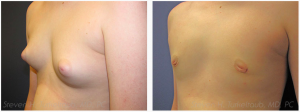Home|Blog | Gynecomastia in Puberty
Gynecomastia in Puberty
Puberty is the time when young girls are excited about truly growing up and developing breasts. For boys, they are liking breasts also – just not their own!
 Unfortunately, most males do experience some level of breast growth during puberty, which is known as pubertal gynecomastia. This developmental gynecomastia does regress and disappear naturally by the end of puberty in the vast majority of those who have it. However, out of those whose enlarged breasts persist into adulthood, many have to deal with emotional and self-confidence issues that can significantly affect one’s quality of life.
Unfortunately, most males do experience some level of breast growth during puberty, which is known as pubertal gynecomastia. This developmental gynecomastia does regress and disappear naturally by the end of puberty in the vast majority of those who have it. However, out of those whose enlarged breasts persist into adulthood, many have to deal with emotional and self-confidence issues that can significantly affect one’s quality of life.
Fortunately, male breast reduction surgery is an effective solution.
Why Pubertal Gynecomastia Occurs
Gynecomastia in puberty may start as early as age 10, peak in the early teen years, and then decline and disappear through the later teen years. This male breast growth is a direct consequence of the complex hormonal changes that naturally occur during this period of time. While the markedly elevated male hormone levels in puberty ultimately lead to the development of adult male body characteristics such as facial hair, a deeper voice, bone and muscular changes the also elevated female hormones like estrogen can lead to breast tissue growth.
What You Can Do About Gynecomastia in Puberty
Because pubertal gynecomastia ultimately disappears in the majority of males afflicted, it is generally recommended to wait until the end of puberty before considering surgical treatment. There are, however, some exceptions to this such as those experiencing more extreme cases of gynecomastia (“B”, “C” cup sizes and larger) that can also be compounded by other issues including obesity and extremely elevated levels of particular female hormones. Plastic surgery can also be considered in those affected teenage boys who experience emotional, social, or psychological trauma as a result of their gynecomastia.
Marijuana, anabolic steroids used for body building and certain medications that cause male breast growth should definitely be avoided. For individuals who are considerably overweight or obese, substantial weight loss through diet and exercise can significantly reduce the severity of the gynecomastia.
For those select individuals who are deemed to be appropriate candidates for surgery, male breast reduction surgery can be very effective in addressing pubertal gynecomastia. This plastic surgery entails the removal of excess male breast tissue (as well as fat and skin, when warranted) so as to result in a more masculine appearing chest AND a happier, more self-confident person.
If you would like to learn more about gynecomastia in teens or adults, schedule your consultation with Dr. Steven H. Turkeltaub. Dr. Turkeltaub can offer you detailed information and discuss appropriate treatment options. Call our office at (480) 451–3000 or fill out our online contact form to book your appointment today.